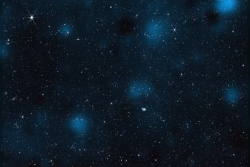
Cosmology is the study of the Universe as a whole: its origin and evolution. Our work is driven by curiosity to understand the cosmos we see around us today. We want to understand the fundamental physical laws at work, including gravity and the nature of spacetime, and how these laws of nature play out in the formation and evolution of stars and galaxies.
Modern cosmology and astrophysics are also driven by technological advances which enable us to see ever further out into the Universe and with greater detail and precision. By looking deeper into the Universe we can test the laws of physics in regimes not accessible in experiments on Earth. Astrophysicists have found evidence for black holes, dark matter and dark energy in the Universe that will shape future scientific advances. By probing the origin of structure in the very early universe, we're testing ideas about quantum gravity.
We build physical and analytical models of astrophysical systems, carry out detailed numerical simulations and apply data analysis to make quantitative statistical inferences. We're also innovating by developing advanced techniques in data science, analysis and inference, for astrophysical, medical and societal applications. Much of our work takes place within the University's Institute of Cosmology and Gravitation.
Our programme of outreach and public engagement seeks to inspire the next generation of scientists through working with local schools, events and citizen science projects.
Cosmology graduates have gone on to apply the problem-solving skills they develop in cosmology and astrophysics in careers including data science, finance, defence systems and biological modelling.
Header image credit: NASA Goddard
Our Cosmology and Astrophysics areas of expertise
Astrophysics
We're working to better understand the basic building blocks of our Universe, the origin of stars, the formation and evolution of galaxies, and stellar population models. Explore our astrophysics research

Gravitational waves
We're detecting cosmic gravitational waves and developing gravitational-wave observations as an astronomical tool.

Observational Cosmology
We're mapping the Universe on the largest scales to understand dark energy, studying the clustering of galaxies and dark matter, and observing transient events and supernovae.

Theoretical cosmology
We're exploring the inflation of the very early Universe, the impact of dark energy on its geometry and developing tests to monitor its expansion.

Interested in a PhD in Cosmology and Astrophysics?
Explore our Cosmology and Astrophysics postgraduate research degrees – including PhDs and MPhils.
Research groups
Institute of Cosmology and Gravitation
Researchers at our Institute of Cosmology & Gravitation explore the evolution of our Universe and aim to inspire the next generation of scientists.

Applied Physics Research Group
We're exploring research in quantum information technologies, quantum optics and quantum foundations and applied advanced materials.


NASA Reveals New Details about Dark Matter’s Influence on the Universe

Portsmouth and Southampton scientists help secure the first capture of light in all its colours from cosmic objects

University of Portsmouth Astronomer Dr Nicolas Bonne, in photo exhibition celebrating blind and partially sighted people

New breakthrough could sharpen our view of colliding black holes

